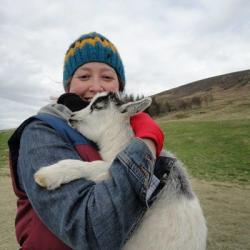Born and raised in Istanbul, Turkey, Saadet Ozdemir Hilmarsson moved to Iceland in 2008 when she married her Icelandic husband. Before moving, she had studied tourism and hotel management in Istanbul, and was also certified as a kindergarten teacher. Despite her professional skills, finding permanent employment has been hard, she says. “I am jobless at the moment because of the language barrier.”
Saadet is currently studying Icelandic, and speaks enough English to get by in daily life. But she is also eager to find a community in her new home, to take part in cultural events and organisations like she regularly did in Istanbul. “Since I arrived, I’ve been digging around,” she says. “I wonder, what more can I do to adapt to the life and culture?”
Lenka Kovářová, a Czech woman who completed a Master’s degree in Nordic Religion at the University of Iceland and has lived in Reykjavík for nearly seven years, has asked herself similar questions. Lenka speaks fluent Icelandic but is also finding the Reykjavík job market to be tough. “I am at a crossroads,” she said. “I am looking for ways to make connections and meet new people.”
Enter the new Café Lingua program at the Reykjavík City Library. This weekly programme is part of the library’s extensive multicultural initiatives and aims to bring Reykjavík residents together in the spirit of linguistic exchange and exploration. “Our languages, whether they are mother tongues or foreign languages, give us both roots and wings,” says Kristín R. Vilhjálmsdóttir, the director of multicultural projects at the library, who organised the programme.
Breaking Barriers
At its inaugural event in November 2012, native speakers of 14 different languages—from Icelandic and Lithuanian to Arabic and Filipino—were invited to represent their mother tongue in a round of “language speed-dating,” where the nearly 80 guests were given the chance to “meet” each language in a series of five-minute introductions.
Saadet, who had seen an announcement for Café Lingua on Facebook, volunteered to represent Turkish. She thought it would be a good opportunity to meet other people who share her interest in learning about other cultures, give some positive context for her country—which she says is often only known through negative news—and dispel some confusion around the Turkish language. “Turkish is often mixed up with other Middle Eastern languages.”
Tung Phuong Vu, who is interested in linguistics, had parallel motivations for participating. “There wasn’t a Vietnamese representative, so I thought it was a great opportunity to represent our language. I realised after talking with people in Café Lingua that many foreign friends thought that Vietnamese uses the same characters as other countries in the region. But afterwards, they seemed to have more comprehensive understanding about our language.”
Lenka was one of two Czech representatives and was pleased that people were interested in the Czech language, which has a very complex grammar and pronunciation. She was also happy to have the opportunity to distinguish Czech culture from that of other Slavic countries. “There aren’t many Czech people in Iceland,” she said. “We have a very rich culture. It is nice to have the opportunity to show people the things that are unique in our culture and language.” The Café Lingua meetings, she said, have been good opportunities to “build bridges” over any preconceptions that people have about a particular country or region, and find to common ground as well as understand difference.
Building Bridges
Café Lingua has also been a place for people to put their current language skills into practice. Joanna Marcinkowska, Café Lingua’s Polish representative who is an advisor for foreigners at Reykjavík’s Human Rights Office, believes that an informal social environment is key for new speakers of a language. “It always works better when you are not in the classroom. Especially for people who already have some knowledge of the language but are not able to practice it ‘live.’”
Since the first Café Lingua, there have been further language speed dating rounds, as well as a multilingual poetry reading and a Christmas-themed event where attendees shared holiday songs and customs while enjoying gingerbread and jólaglögg. In February, the library will host a conversation with Icelandic musician Tómas R. Einarsson, who will speak about his experiences learning Spanish, as well as the Cuban influences in his music, much of which has been recorded in Havana, Cuba.
For Saadet, seeing other people’s interest in other cultures and languages at Café Lingua has been clarifying. “It was like turning a light on…In Turkish, there is a proverb that says, “The person who speaks one language, is one person; the person who speaks two languages, is two.”
—
Café Lingua meetings are held every Monday from 17:00–18:00 at the main branch of the Reykjavík City Library (Tryggvagata 15, 101 Reykjavík). Information about forthcoming events can be found on the Café Lingua Facebook page or on the Reykjavík City Library website: www.borgarbokasafn.is.
Buy subscriptions, t-shirts and more from our shop right here!


















